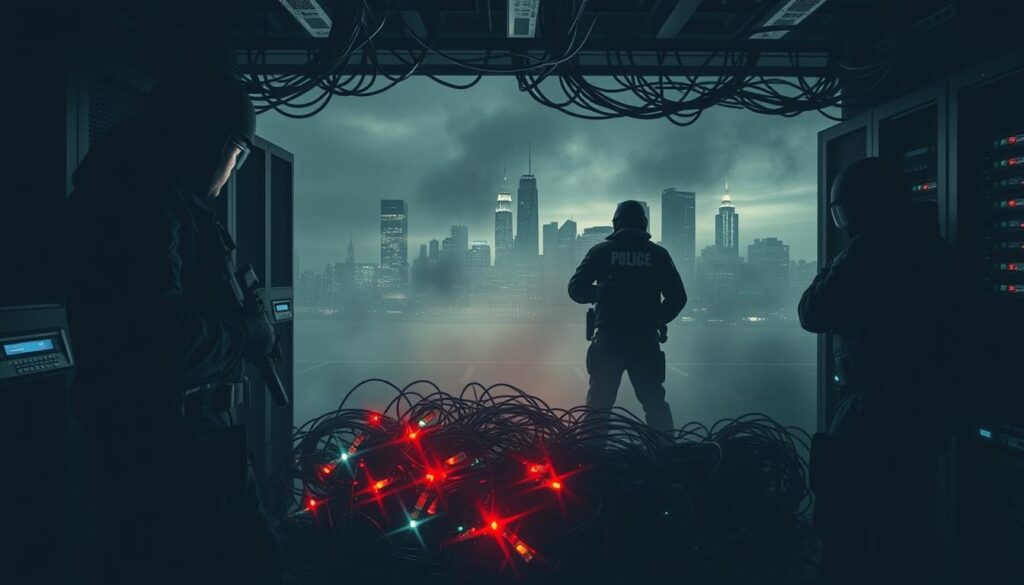Imagine losing access to your favorite shows overnight – a reality for 22 million people after law enforcement dismantled one of Europe’s largest illegal streaming networks. This crackdown, led by Europol, resulted in 11 arrests and investigations spanning 102 suspects. Similar actions in the U.S. have targeted operations like AnytimeTV and Cobra Servers, signaling a global shift in how authorities handle digital piracy.
Recent collaborations between agencies like the MPA’s ACE and international task forces reveal a new era of enforcement. Authorities now use advanced tracking tools and cross-border partnerships to identify illegal operations faster than ever. For users, this means popular services can vanish without warning – along with their paid subscriptions.
The stakes are rising for consumers, too. Many don’t realize that accessing unauthorized content could lead to fines or legal trouble. As traditional cable costs climb, affordable alternatives like free trials from verified platforms offer safer options with customer support via WhatsApp.
Key Takeaways
- Global agencies are using coordinated strategies to disrupt illegal streaming networks
- Users risk losing access and facing penalties with unauthorized services
- Legal alternatives provide reliable access with customer protection
- Detection methods have improved, making piracy harder to sustain
- Education about service legitimacy is critical as enforcement intensifies
Recent Developments in Law Enforcement and Content Protection
Authorities are intensifying efforts to dismantle unauthorized streaming networks through coordinated legal action and technological innovation. These initiatives blend traditional investigative methods with emerging AI tools, creating unprecedented challenges for illegal operators.

U.S. Enforcement Actions and High-Profile Settlements
The MPA’s recent $2 million settlements with three streaming operators reveal critical patterns. Investigators traced services through:
- Public WHOIS records exposing real names
- LinkedIn profiles advertising illegal operations
- Review platform engagement leaving digital trails
Former FBI official Larissa Knapp now leads the MPA’s anti-piracy division. Her team seized domains like anytimetv.us and elite-servers.com, redirecting traffic to legal alternatives. “We’re targeting entire ecosystems – from payment processors to social media promoters,” Knapp stated.
The Role of AI and Evolving Content Protection Strategies
Modern enforcement combines machine learning with human analysis:
| Traditional Methods | AI Enhancements | Results |
|---|---|---|
| Domain monitoring | Pattern recognition | 93% faster detection |
| Financial audits | Blockchain tracking | $4.7M recovered (2023) |
| Manual investigations | Behavior prediction models | 102 suspects identified |
The entertainment industry now uses these tools to predict emerging threats. While AI handles data analysis, legal experts assess fair use complexities. For risk-free viewing, many choose verified platforms offering free trials and WhatsApp support.
Spotlight on iptv providers shut down

A coordinated international effort uncovered a massive piracy network spanning 10 countries. Europol’s operation dismantled infrastructure supporting 22 million users, with authorities seizing servers and devices worth millions. This crackdown revealed how illegal services often fund broader criminal activities – from cybercrime to drug trafficking.
Case Analysis and Impact on Subscribers
Thousands lost access overnight when popular platforms vanished. Customers of Elite Servers and similar media distributors reported abrupt service cuts in June. Many paid for annual plans but received no refunds when sites disappeared.
Law enforcement found user data during raids, raising concerns about subscriber privacy. While most users face no charges, authorities warn against supporting unverified services. Legal alternatives with free trials provide safer access to content.
Financial Settlements and Enforcement Measures
The operation recovered €1.7 million in crypto and cash, plus weapons and drugs. Investigators tracked operators through:
- Payment processor records
- Social media promotions
- Domain registration details
Recent $2 million settlements against U.S.-based suspects show increased enforcement rigor. As one investigator noted: “We’re targeting every layer – from stream hosts to payment facilitators.”
For uninterrupted viewing, explore verified platforms offering free trials and WhatsApp support. These options deliver content legally while protecting your subscriptions.
Legal and Regulatory Considerations for IPTV Services
Recent legal shifts make streaming piracy riskier than ever. Governments now treat unauthorized content distribution as seriously as physical theft. The UK’s 2017 Digital Economy Act set a precedent with 10-year prison terms for copyright violations.

Understanding Copyright Infringement and the Law
U.S. law changed dramatically in December 2020. The Protecting Lawful Streaming Act closed loopholes, making illegal streaming a felony. Authorities focus on operators rather than viewers, but users still risk:
- Losing access to paid subscriptions
- Exposure during enforcement actions
- Malware from unverified sites
Comparative Perspectives: U.S. vs. Global Regulatory Actions
International cooperation has transformed enforcement. While the U.S. targets operators through financial trails, European agencies prioritize infrastructure takedowns. This table shows key differences:
| Country | Penalties | Legal Focus |
|---|---|---|
| United States | 10-year sentences | Payment processors |
| United Kingdom | £50,000 fines | Network hosts |
| EU Nations | Domain seizures | Server locations |
Verified platforms like Fubo TV and YouTube TV avoid these risks through proper licensing. Many offer free trials with WhatsApp support for easy setup on devices. As one legal expert notes: “Choosing licensed services protects both your wallet and your privacy.”
Conclusion
The streaming landscape has reached a critical turning point as global enforcement intensifies. Recent crackdowns demonstrate authorities’ ability to dismantle unauthorized platforms rapidly. Users now face higher risks – from sudden service loss to potential legal exposure – when accessing unverified content.
Licensed services like Fubo TV and YouTube TV provide safer alternatives with guaranteed access and customer support. These platforms invest in proper media licensing, ensuring creators receive fair compensation. Subscribers enjoy reliable streaming without worrying about malware or data theft.
As enforcement grows more sophisticated, choosing legal options becomes crucial. Explore trusted services offering free trials to experience premium channels securely. Many include WhatsApp support for instant troubleshooting on all devices.
The industry‘s coordinated efforts protect both viewers and creators. By selecting verified services, you avoid supporting criminal networks while accessing better-quality streams. This shift ensures sustainable entertainment ecosystems for future audiences.
FAQ
How do law enforcement agencies track illegal streaming platforms?
Authorities use advanced tools like AI-powered monitoring systems to identify unauthorized content distribution. They also collaborate with copyright holders and analyze payment networks to trace operators of unlicensed services.
Can subscribers face penalties for using shut-down services?
While most enforcement targets operators, users risk losing access to paid subscriptions or exposing personal data. In some cases, repeated use of illegal platforms may lead to warnings or fines under digital piracy laws.
What distinguishes legal streaming services from unauthorized providers?
Licensed platforms like Netflix or Hulu directly partner with content creators and pay royalties. Unauthorized services typically lack these agreements and offer premium channels at suspiciously low prices without proper licensing.
Why are global crackdowns on streaming platforms increasing?
Media companies report losing billions annually to piracy, driving coordinated efforts like the EU’s “FAST” initiative and U.S. Department of Justice prosecutions. Improved cross-border collaboration enables wider enforcement against illegal networks.
What happens to seized equipment during anti-piracy raids?
Authorities confiscate servers, streaming devices, and financial records as evidence. These assets are often destroyed or repurposed after trials, while proceeds from illegal operations may be reclaimed through court-ordered settlements.
How do copyright holders calculate damages in piracy cases?
Courts assess penalties based on stolen content value, subscriber counts, and advertising revenue. Recent cases like the million Xtreme IPTV settlement reflect the scale of potential financial consequences for operators.



